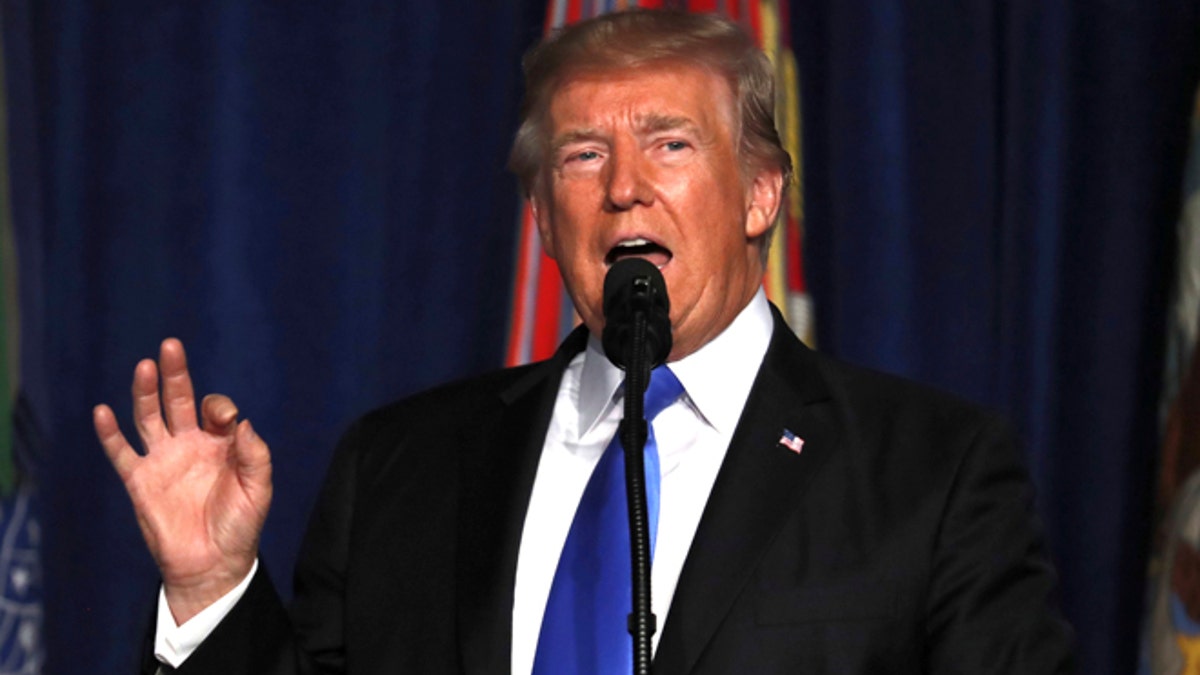
President Donald Trump speaks at Fort Myer in Arlington Va., Monday, Aug. 21, 2017, during a Presidential Address to the Nation about a strategy he believes will best position the U.S. to eventually declare victory in Afghanistan. (AP Photo/Carolyn Kaster) (Copyright 2017 The Associated Press. All rights reserved.)
Donald Trump’s detractors may believe his presidency has been totally eclipsed, but like what happened to the sun yesterday, it always comes back into blinding view.
There’s been a lot of media chatter, in the wake of Charlottesville, about how the president has forfeited part of his job. This was “The Week When President Trump Resigned,” liberal New York Times columnist Frank Bruni wrote (that is, “if we regard the job as one of moral stewardship”). The business advisory councils have been abolished, he and his wife have bowed out of the Kennedy Center Honors, and so on.
As Politico pointed out, in 10 of the 30 weeks of his White House tenure, some pundits have declared it to be the “worst week” of his presidency. That was an echo of the campaign, when the press repeatedly decided he was dead in the water.
But no matter how much a president may seem marginalized by the press—Bill Clinton had to insist after his party was decimated in 1994 that the Constitution gave him “relevance”—such periods are always temporary. Given all the responsibilities of the leader of the free world, it doesn’t take much of a shift in the landscape to put him back at the center of the world stage.
Thus it was that the commander-in-chief is having to grapple with Afghanistan.
It doesn’t matter if his polls are down or he’s drawing negative press, he still faces the maddening complexities of what’s become America’s longest war.
Candidate Trump heavily criticized the U.S. invasion of Iraq—Afghanistan, not so much—and his instincts are undoubtedly to minimize our military footprint. As the Times noted, Trump tweeted about Afghanistan in 2013: “We should have a speedy withdrawal. Why should we keep wasting our money — rebuild the U.S.!”
But Trump has also installed a trio of retired generals—Jim Mattis, H.R. McMaster, John Kelly—at the top of his administration, and they are not in favor of what George W. Bush used to call cutting and running.
Trump sounded like a reluctant warrior in last night’s speech from Fort Myer, Va. He said his original instinct was to pull out of Afghanistan, but that the consequences of a rapid exit “are both predictable and unacceptable.” He said the “immense” security threats required him to lift restrictions on the military targeting terrorists. And in a swipe at Barack Obama, he said military moves would be guided by conditions on the ground, “not arbitrary timetables.”
“We are not nation-building. We are killing terrorists,” Trump said in the closest thing to a sound bite.
It was not a rousing call to arms. In fact, Trump said that “military power alone” could not prevail and that “our patience is not unlimited.”
The president did not provide a headline-making number for an escalation of the war, however modest. He simply said he would seek “additional troop and funding increases.” It sounded like a split-the-difference speech.
The challenge for Trump is that he also ran as the tough-on-terrorism candidate, and a total U.S. withdrawal would give the Taliban free rein to plot future attacks on the West. Afghanistan was, of course, the staging ground for 9/11.
Obama, who also had antiwar instincts, struggled with Afghanistan throughout his eight years, at one point announcing a military surge to be followed by a drawdown—which drew flak from many military strategists.
Trump inherited this mess, to be sure. But after having made the prime-time speech, it is now Trump’s war—a fact of political life that is not likely to be eclipsed.




